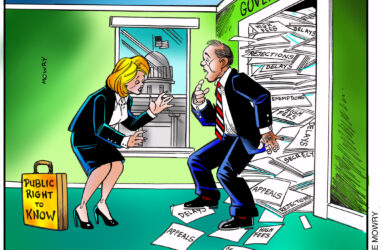In last week’s edition, The Chronicle reported that at the monthly Creswell School Board (CSB) meeting on Wednesday, March 14, this reporter was unjustly kicked out of an executive session — a violation of Publics Meetings Law.
To catch up, read that story here: https://goo.gl/pMnzDv
The Chronicle worked to resolve the issue with the school board and district administrators before presstime last week. When no phone calls or email correspondences were returned to this reporter by press time, it was our responsibility to move forward on an editorial, which stated that we would request to obtain the executive meeting materials that were withheld.
In this week’s edition, we report that Superintendent Todd Hamilton and Board Chair Mike Anderson did in fact agree to meet after press time on Wednesday, March 21. But while the District technically complied with our requests to hand over executive sessions materials, upon further inspection, it appears that the documents are shells, lacking pertinent information.
It is of note that The Chronicle offered Chair Anderson and Superintendent Hamilton opportunities to make comments or rebuttals for publication, but they had chosen not to.
Hamilton said the District consulted with attorneys Spencer Lewis of the Oregon School Board Association and Nancy Hungerford of Hungerford Law Firm on whether or not to allow media in that executive session. Anderson said that one attorney advised allowing media only for a portion of the meeting, and another suggested disallowing media altogether. It is not clear which attorney offered what advice, and associations such as these cannot respond to media inquiries on what advice was or was not given.
Superintendent Hamilton said that media access was initially excluded because the subject matter included a student’s medical records. The executive session items were not listed under ORS 192.660(4), which is the statute, “to consider expulsion of an elementary or secondary school student or matters pertaining to a student’s confidential medical records.”
Under that statute, the media would not be allowed to attend.
But two items being discussed were, “to hear complaints or charges brought against a public officer, employee, staff member or individual agent who does not request an open hearing – pursuant to ORS 192.660(2)(b), and “to consider information or records that are exempt by law from public inspection – pursuant to ORS 192.660(2)(f).”
Neither of those statutes qualify for media exemption, and The Chronicle did not examine any medical records from the executive session materials presented — only email correspondences that alluded to a person’s medical issues.
As for meeting minutes, Public Meetings Law requires that the governing body of a public body provide either sound, video/digital recording or written minutes of its meetings, including executive sessions. Hamilton said that the District does not capture audio recordings for such meetings, but a short memo presented as “minutes” was handed over, albeit it a noticeably bareboned account.
The meeting minutes only stated that the executive session was about held for about 45 minutes, listed the board members that were present, and one sentence that stated the board simply had a “discussion” with the restatement of the statutes’ rhetoric.
Ball Janik LLP Attorney Jack Orchard, who represents the Oregon Newspaper Publishers Association, said that while meeting minutes can come in many forms, the minutes presented to The Chronicle from that executive session are not true minutes.
“Those meeting minutes do not satisfy Oregon law,” Orchard said. “Those are not minutes, just a reiteration of the statutes already presented.”
According to the Attorney General’s Public Records and Meetings Manual, written minutes do not need to be a verbatim transcript, but whatever means of recording is used must give “a true reflection of the matters discussed at the meeting and the views of the participants.”
The presented minutes did not list motions, proposals, resolutions, orders, measures proposed and their disposition, results of all votes and the vote of each member by name, the substance of any discussion on any matter and a reference to any document discussed at the meeting, as stated for minutes requirements in the Attorney General’s Public Records and Meetings Manual.
Ultimately, while the District did agree to allow media to examine the executive session materials, The Chronicle is unsatisfied with the scarcity of information presented.
Following Orchard’s advice on how to proceed, The Chronicle requested Tuesday to see Board Secretary Marilyn Cruzan’s written/typed meeting notes of that executive session, which are required to be kept by law. These written/typed notes should provide additional substance of the discussions and their deliberations held in that executive session.
The Chronicle will continue to request executive session information in full.






